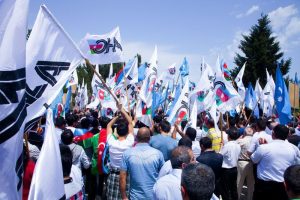
Staff Writer
Tens of thousands of Azerbaijanis on Monday marched through Karabakh, celebrating the one-year anniversary of Azerbaijan’s recapture of much of Armenian occupied Nagorno Karabakh, with a large flag unfurled and hoisted in celebration. November10 is now marked as victory day, after the corresponding date in 2020 saw Azerbaijani forces, with the assistance of Turkey, retake the strategic city of Shusha, which forced Armenian forces to accept a Russian brokered truce 2 days later.
Meanwhile, in neighbouring Armenia, thousands marched in Yerevan in opposition to Prime Minister Nicol Pashinyan’s concessions, which were initially unpopular, but which are now accepted by most Armenians. Pashinyan won a June snap poll by more than 30% from his closest rival, following calls for his resignation after Armenia’s relatively large defeat in Nagorno Karabakh in 2020.
Nagorno Karabakh is a strategic region bordering Azerbaijan and Armenia, which is internationally recognised as belonging to Azerbaijan, but which has been occupied by Armenia since the 1990s. thousands of Armenians and Azerbaijanis have been killed in repeated skirmishes, as Azerbaijan tries to recapture its territory, with over a million being forcibly displaced by the Armenian-Azerbajani conflict in the 1990s, which resulted in Yerevan controlling the territory. Thousands have been killed and over a million displaced as the war continued. A 6-week war between September and November 2020 saw Azerbaijan capture much of Karabakh, and Armenia being forced to agree to a ceasefire. A pace agreement is close, but has not yet been concluded; the facts on the ground have changed in favour of Baku.
Speaking to Radio Islam International, Turan Karfili, a researcher with TRT’s World Research Centre, reiterated the reasons behind the celebrations, pointing out that the territory is considered by most as Azerbaijani. He alluded to the week-long celebrations, arguing that it was not only celebrated within Azerbaijan, but also by the diaspora.
Karfili also alluded to the evolution of the situation in the year since, especially in Armenia, wherein the Prime Minister faced much backlash, causing him to organise snap polls in June, which saw his civil contract party win 53% of the vote. He argued that two fronts were emerging, one that favours cooperation and another which wants to regain Karabakh from Azerbaijan, and that currently the former is in the ascendency, “so [from] a political point of view, I would say in Armenia … one side wants the reclamation of the land that they think that it [Armenia] lost against Azerbaijan. And the other side who is more cooperative, who is more into the strengthening the relations with the neighbours.
Karfili alluded to the millions displaced and need for the rebuilding of infrastructure and cultural heritage, arguing that this would take time. Azerbaijan has budgeted over a billion for this purpose, but the uninhabitableness of Karabakh Karfili will mean that it will take an extended period of time to achieve. Significantly Turkish companies are intricately involved in the rebuilding project, which is likely to anger Armenia further.
Last, Karfili argued that cooperation in the caucuses is difficult owing to the many hegemons and conflicts within the region, which have inhibited partnership and mediation; Georgia is opposed to Russia, while Armenia is supported by Iran, but opposed by Turkey. This has meant that cooperation at a regional level has been limited, despite the fact that the region stands to benefit much from this.







0 Comments